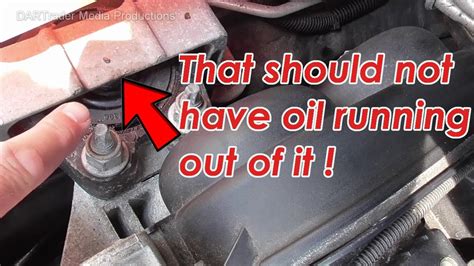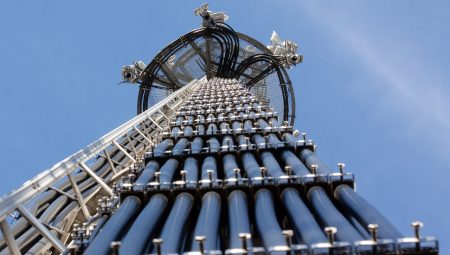Discover symptoms, causes, and impacts of engine mount leaking. Learn repair strategies and preventive maintenance tips to ensure optimal engine performance.Engine mounts play a crucial role in securing the engine to the vehicle’s frame while absorbing vibrations during operation. However, when these mounts begin to leak, it can lead to a host of problems that affect both performance and safety. Recognizing the symptoms of a leaking engine mount early on can help you avoid more serious damage down the line. In this blog post, we will explore the signs to look for, the potential impact on engine performance, and the common causes of engine mount leaks. Furthermore, we’ll discuss effective strategies for repairing these leaks, as well as preventive maintenance tips to ensure your engine mounts stay in top condition. Stay informed to keep your engine running smoothly and extend its lifespan.
Symptoms of Engine Mount Leaking
Identifying the symptoms of engine mount leaking can be crucial for maintaining the overall health of your vehicle’s engine as these symptoms often lead to additional damage if not addressed promptly; one of the most noticeable indicators that could signify a potential issue is the presence of excessive engine vibrations that feel more pronounced than usual, which can result from deteriorating or dislodged mounts that are no longer able to effectively dampen the vibrations produced by the engine during operation.
In addition to noticeable vibrations, you may also experience a distinct clunking noise when shifting gears, accelerating, or decelerating, which often indicates that the engine is struggling to stay aligned as it moves within its compartment; a poorly mounted engine can lead to an unstable drive, thus heightening the likelihood of these unsettling sounds, while also causing discomfort to the passengers.
Lastly, an unusual angle in the positioning of the engine or visible oil leaks underneath the vehicle can also point to a leaking engine mount, where the actual rubber or hydraulic material has begun to wear out or tear, eventually causing the engine to sag in its place and potentially leading to complications with the connection to the transmission or related components, making it imperative for drivers to remain vigilant for these telltale signs and seek professional inspection and guidance as needed.
Impact on Engine Performance
The impact of engine mount leaking on the overall performance of an engine is significant, as this vital component plays a crucial role in controlling vibrations and ensuring a smooth running of the engine, and when it fails, not only can it lead to increased vibrations within the vehicle, causing discomfort for occupants, but it can also result in misalignment of the engine itself, which may lead to further complications such as increased wear and tear on various associated components, ultimately affecting the longevity and efficiency of the vehicle.
When an engine mount is compromised due to leaking fluid, typically of a rubber compound or other damping materials, it frequently results in an assortment of noticeable symptoms, including excessive engine noise, unusual vibrations felt through the cabin, and, in more severe cases, even damage to the exhaust system and steering mounts due to the unsettled positioning of the engine, all of which can lead to a decrease in the vehicle’s overall power delivery and responsiveness.
Therefore, proactively addressing any signs of engine mount leaking is not merely a matter of comfort, but rather an essential action that should be taken to preserve the functionality and decrease the likelihood of larger, costlier repairs down the line; this can be achieved not only by regular inspections and maintenance but also by understanding the tell-tale signs that indicate when your engine mounts may be failing, thus ensuring that your engine operates at peak performance for many miles to come.
Causes of Engine Mount Leaking
Understanding the causes of engine mount leaking is crucial for any vehicle owner, as this silent issue can lead to significant engine performance problems if not addressed promptly, and it primarily stems from a variety of factors including wear and tear, exposure to extreme temperatures, and the degradation of materials used in the mount’s construction over time.
One of the primary culprits behind engine mount leaks is the natural degradation of the rubber compounds that make up the mount, which can occur due to prolonged exposure to engine oil, coolant, or road debris, while heat from the engine can accelerate this degradation process; as the rubber breaks down, it can develop cracks or warping, thereby creating a pathway for fluids to escape.
Furthermore, factors such as poor installation, improper alignment, and even a lack of regular vehicle maintenance can contribute to the deterioration of the engine mount, leading to significant leaks, and in turn, this often results in a cascade of issues, including increased vibrations, excessive engine movement, and ultimately compromising the overall engine performance of the vehicle.
Repairing Engine Mount Leaks
Repairing engine mount leaks is an essential aspect of vehicle maintenance that not only ensures the longevity of your car’s performance but also enhances safety on the road, as defective engine mounts can lead to severe vibrations and misalignment, which can ultimately damage other engine components and compromise the overall integrity of the vehicle. To begin the repair process, one must first identify the symptoms of a leaking engine mount, such as excessive engine vibration or visible fluid leaks under the vehicle, as these signs will guide your efforts in addressing the issue effectively.
Once you’ve confirmed that the engine mount is indeed leaking, the next step is to consult a professional mechanic or consider performing the repair yourself if you possess the necessary skills and tools, as repairing engine mounts typically involves either replacing the damaged mount with a new one, which can be found at auto parts stores, or in some cases, using a reliable sealant to temporarily mend small leaks. When opting for replacement, it is crucial to ensure that the new mount matches the specifications of your vehicle to avoid complications, and it is advisable to replace all engine mounts simultaneously to maintain balance and performance.
Moreover, keeping a detailed record of the repair work and parts used during the process greatly contributes to maintaining the vehicle’s history and assists future technicians or mechanics in understanding the vehicle’s condition should further issues arise. It is also beneficial to perform regular inspections and preventative maintenance on your engine mounts, as attention to these components can save money in the long run by avoiding more significant repairs that may occur as a result of neglecting engine mount health.
Preventive Maintenance for Engine Mounts
When it comes to ensuring the longevity and optimal performance of your vehicle, one of the most often overlooked components is the engine mount, which plays a crucial role in isolating engine vibrations and securing the engine in position; therefore, understanding the techniques for effective preventive maintenance can significantly enhance both the lifespan of the engine mounts and the overall performance of the engine.
The first step in preventive maintenance for engine mounts is to conduct regular inspections, where it is essential to visually check for signs of wear and tear, including cracks, deterioration, or significant fluid leakage, as these symptoms can indicate that the engine mount is nearing the end of its life, and addressing these issues promptly can help avoid more complex repairs down the line.
Additionally, maintaining the overall health of your vehicle through routine engine tune-ups and ensuring that fluids, such as oil and coolant, are at adequate levels will not only boost the engine’s performance but can also minimize excessive strain on the engine mounts, as well as contribute to a smoother ride overall, hence making it imperative for car owners to take a proactive approach in the maintenance of their vehicle.
To summarize, keeping your engine mounts in good condition requires consistent care and inspection; proactive measures, such as refraining from overloading the vehicle and addressing any unusual engine vibrations early, will go a long way towards ensuring that your engine mounts serve their purpose effectively and maintain a strong connection between your engine and the vehicle’s frame.
Frequently Asked Questions
What are the signs of a leaking engine mount?
Common signs include excessive vibration when driving, a noticeable decrease in the smoothness of engine operation, or visible fluid stains around the engine mount area.
How do engine mounts function?
Engine mounts are designed to secure the engine to the vehicle’s frame while dampening vibrations and absorbing shocks to provide a smoother ride.
What causes engine mounts to leak?
Leaking engine mounts can be caused by wear and tear over time, exposure to extreme temperatures, or damage from impacts or accidents.
Is it safe to drive with a leaking engine mount?
While it may be possible to drive with a leaking engine mount, it’s not recommended as it can lead to more serious engine alignment issues and further damage.
How can I check my engine mount for leaks?
You can check for leaks by visually inspecting the engine mount for any cracks or fluid leaks, and by gently shaking the engine to see if there is excessive movement.
What types of fluids might be leaking from an engine mount?
The fluid leaking from an engine mount is typically a type of oil or hydraulic fluid, as many mounts are filled with fluid for added dampening.
How much does it cost to repair or replace a leaking engine mount?
The cost can vary widely depending on the make and model of the vehicle, but typically ranges from $200 to $600, including parts and labor.





